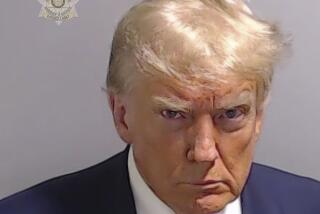Trial of 8 in Plot to Kill Pope Expected to Be Explosive, Lengthy
- Share via
ROME — The politically explosive trial of three Bulgarians and five Turks charged with plotting to kill Pope John Paul II, possibly at the behest of Soviet intelligence agents, opens in a top-security Rome courtroom Monday and may grind on for a year.
“Some of the prosecutors are saying four or five months, but we think it will take at least a year,” said Giuseppe Consolo, attorney for Sergei Ivanov Antonov, the only Bulgarian who, along with three of the accused Turks, will actually face the two judges and six jurors in the heavily fortified court.
Two other alleged Bulgarian secret agents and two Turks accused of organizing or aiding convicted terrorist Mehmet Ali Agca’s near-fatal shooting of the Pope on May 13, 1981, will be tried in absentia.
Agca, 28, already serving a life sentence in Italy for the shooting, faces the relatively minor additional charge in Monday’s trial of smuggling into the country the gun that he used in the assault. Antonov and the others are charged with varying degrees of complicity in a murder conspiracy.
Hearing in Sofia
Consolo said the defense does not expect any surprises in the trial, which he predicted will involve months of technical detail and delays, including “our summer holidays and the need to adjourn to Sofia (Bulgaria) to hear some witnesses.”
The prosecution case against the alleged conspirators already has been detailed in court papers, including a 1,243-page indictment released last October, and appears to rest almost entirely on the testimony of Agca.
Attorneys for the other defendants claim that Agca’s long-running confessions, extracted during more than two years of prison interrogations, are riddled with contradictions and “the lies of Mr. Agca.” An assistant state prosecutor, Antonio Albano, conceded last year that Agca had retracted some of his testimony against Antonov and indulged in “convoluted behavior, mutually damaging statements, and treacherous mixtures of lies simulating truth. . . . “
Although it was not mentioned in the indictment, Albano also strongly suggested that the alleged plot was masterminded by the late Soviet President Yuri V. Andropov when he was head of the KGB, the Soviet security and intelligence service. At the time, the Polish-born pontiff was reportedly considered to be a threat to the Communist government of Poland, then in crisis over the reformist Solidarity movement.
Because of the possibility of Moscow’s involvement in the assassination attempt, the United States and other Western governments have kept the Italian conspiracy case at arm’s length. Proof of a link between the alleged Bulgarian connection and the KGB would place the Western alliance in a quandary over future dealings with a superpower that tried to kill the Pope.
Turkish Gray Wolves
The indictment, which will be read aloud during the first week or more of the trial, recounts the now-familiar story of Agca’s recruitment by Bulgarian secret service agents with help from a leader of the Turkish underworld and members of the Gray Wolves, a Turkish terrorist group for which Agca had killed once before.
The Turkish gang leader, Bekir Celenk, 51, allegedly promised Agca and two friends, Oral Celik, 26, and 32-year-old Musa Serdar Celebi, 3 million West German marks (then about $1.2 million) from the Bulgarians for the proposed killing.
Antonov, then station manager in Rome of the Bulgarian state airline, and two embassy officials, Todor S. Aivazov and Maj. (now Lt. Col.) Zhelio Vasilev, allegedly planned the assassination attempt, helped reconnoiter the scene during an outdoor papal audience in St. Peter’s Square and set up an escape route involving a customs-sealed truck that would whisk the assailants safely out of Italy.
Both Aivazov, 41, and Vasilev, 43, left Italy more than a year after the assassination attempt, and Bulgaria rejected Italy’s request to extradite them for the trial. Antonov was arrested Nov. 25, 1982, and has been held since, charged with overall complicity and with driving Agca and Celik to St. Peter’s on the fateful day. He is under house arrest and in ill health but will appear at the trial, Consolo said.
Celik, said to be Agca’s childhood friend, is accused of firing one of the three bullets that hit the Pope, two in the abdomen and one in the hand. He has been identified by prosecutors as the mysterious “running man,” photographed immediately after the shooting by an American tourist. Unseen since the disputed photograph, he was reported by a Bulgarian government spokesman last week to be under surveillance in France.
Celenk, reportedly the top drugs- and arms-smuggling boss of the Turkish underworld in Bulgaria, remains under loose custody in Sofia where authorities have refused to extradite him to Italy for the trial.
Celebi, an accused right-wing Turkish terrorist who allegedly was to have shared in the million-dollar payoff, was extradited by West Germany, and Omer Bagci, 38, charged with bringing Agca’s 9-millimeter Browning pistol into Italy, was brought back from Switzerland to face trial.
More to Read
Sign up for Essential California
The most important California stories and recommendations in your inbox every morning.
You may occasionally receive promotional content from the Los Angeles Times.










